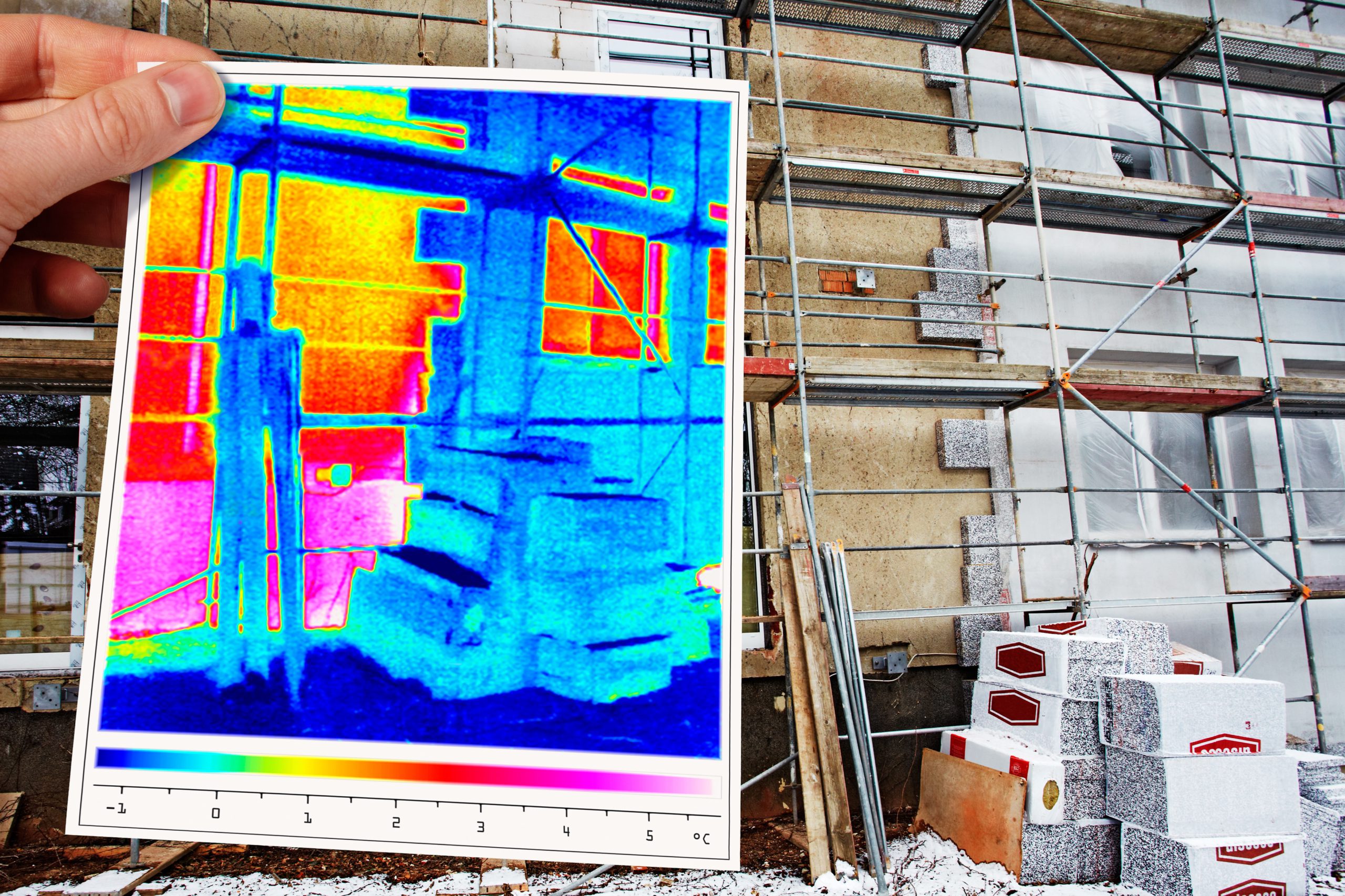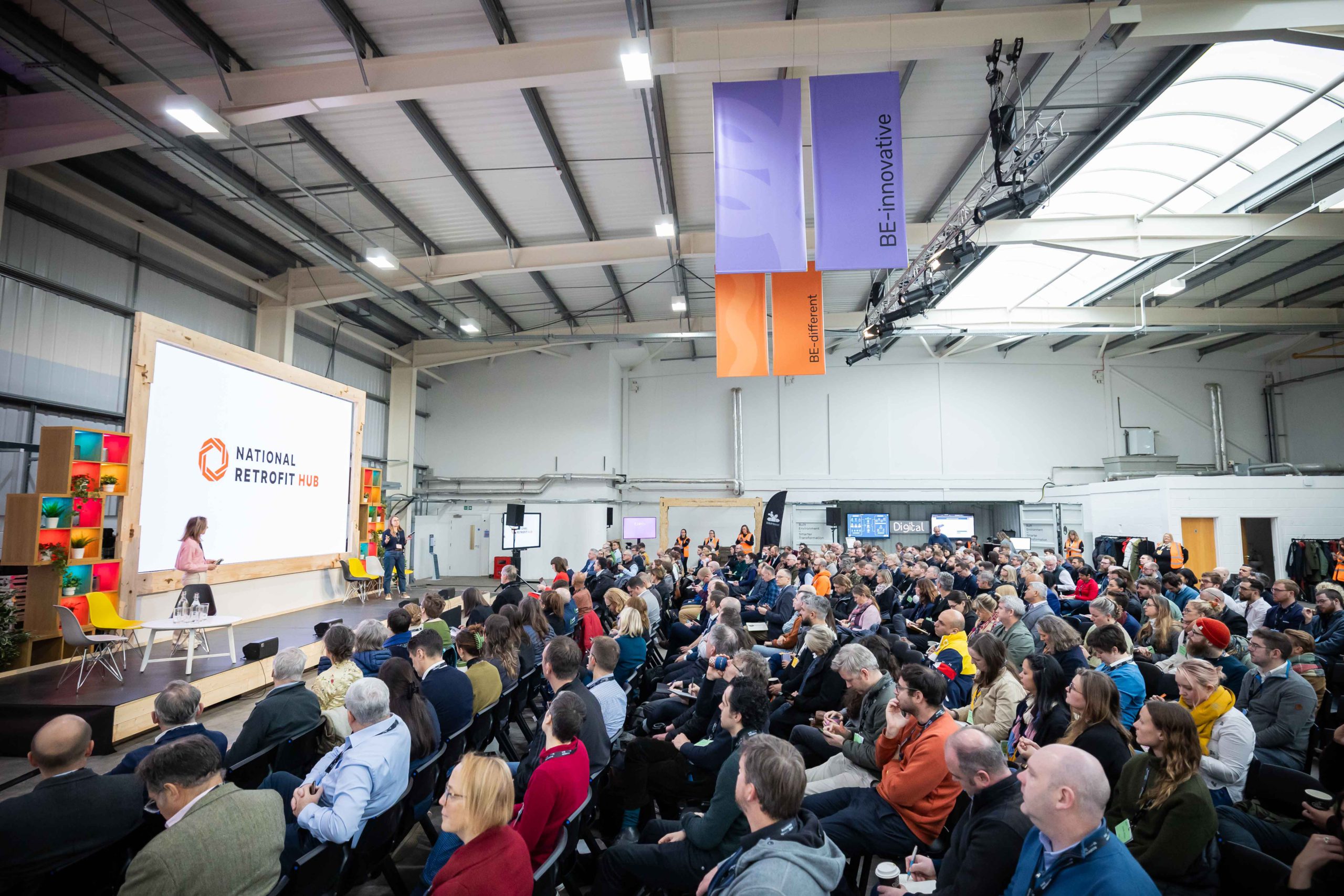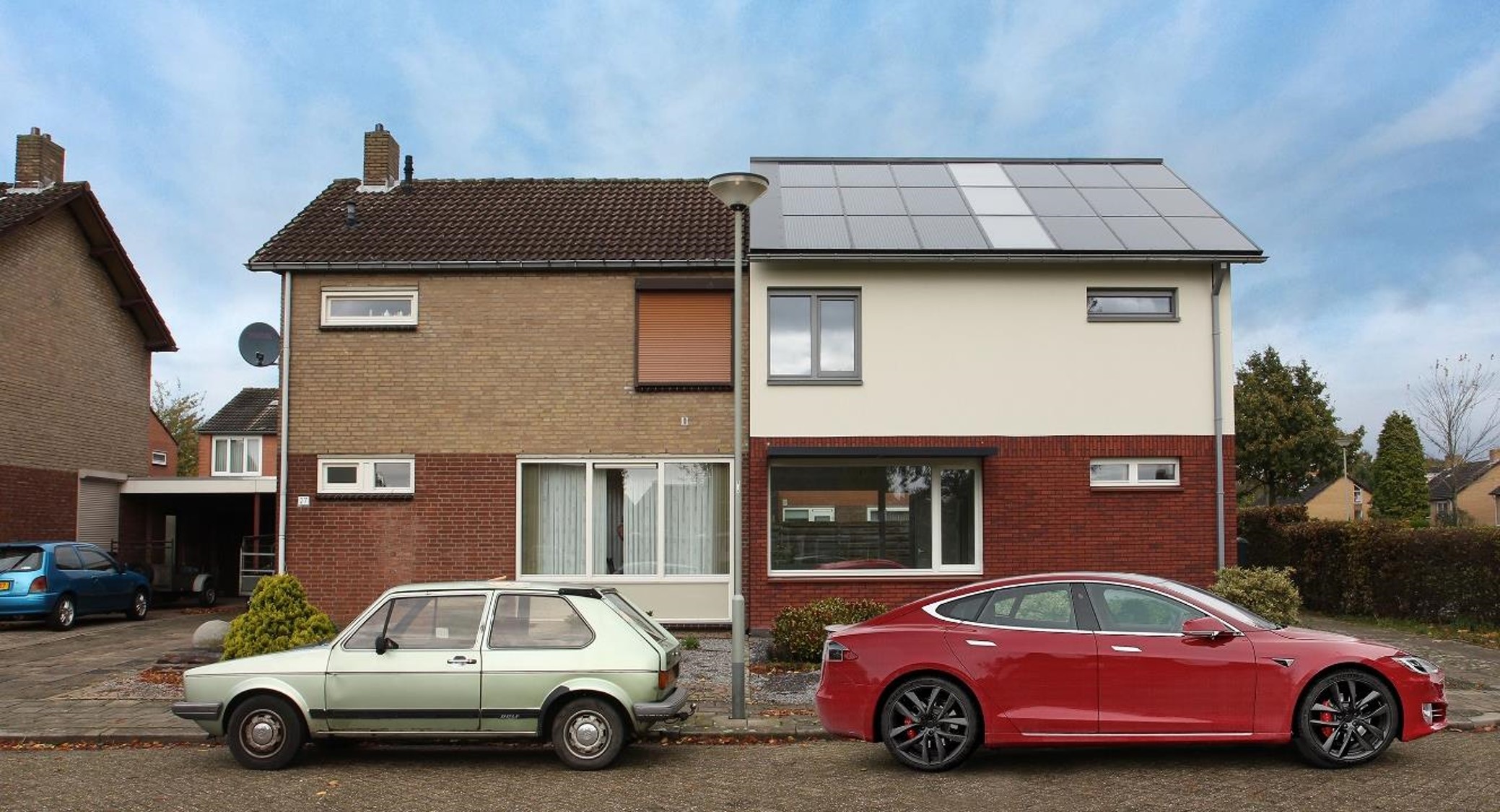Net Zero Heat
Innovate UK’s Net Zero Heat programme works with key partners to overcome barriers to enable a faster roll-out of decarbonised heat for buildings.

About the programme
The UK has to move away from gas as a source of heating space and water in buildings to meet its net zero commitments. Heat in buildings accounts for 23% of UK emissions. To meet the 6th Carbon Budget the UK needs to decarbonise heat for its 30 million buildings. This will be achieved by a combination of reducing demand and a faster, scaled roll out of renewable heating technology. There will be a net benefit to the economy from scaling these solutions faster than other countries alongside greater energy security, lower energy bills, healthier indoor environments and reduced fuel poverty.
The technology to deliver net zero heat mostly exists but has not scaled and industrialised fully due to barriers such as a lack of information for end users, engineering expertise to industrialise, inconsistent regional deployment and a lack of project finance. The programme aims to:
- End the use of gas for heating space and water in all buildings. This means heat decarbonisation for 28.6m homes and 1.9m non-domestic buildings.
- Realise £58-200bn investment to achieve a net benefit to the economy of 10 times that.
- Reduce national energy costs by £7.5bn per year.
- Avoid around 100MtCO2e in heat.
- Generate 200,000+ new jobs.
Our funding is delivered by competitions and sponsorship into our three focus areas.

FOCUS AREA
Data innovation
A data-driven approach to national retrofit activities for greater certainty of outcome and market demand.

FOCUS AREA
Technology innovation
Faster routes for innovative solutions to be proven, accepted and scaled out. Image: Robbie McFadzean for BE-ST

FOCUS AREA
Process innovation
Improved routes to identify and deliver building upgrades at scale that reduce capital and installation costs. Image: Energiesprong UK
What we've funded
-
The aim of this competition is to accelerate the shift to a net zero economy, by developing and testing scalable commercial service propositions that take a data-driven approach to assessing and defining appropriate pathways for upgrading building portfolios, targeting decarbonisation, reducing energy demand, improving heat efficiency, taking an archetypal or typology-based approach, using evidence-based design and creating market certainty.
Solutions will build upon existing data sources, including EPCs, SAP, RdSAP and the PAS 2035 processes. We asked that the projects also consider these wider impacts, including:
- unlocking private investment in building upgrades
- enabling a just and equitable transition, particularly improving access to products and services for low-income households
- giving people more automation of simple tasks and control over their comfort
- enabling energy generation, reducing their energy imports, removing barriers to accessing services that reward positive behaviours, including flexibility or agile tariffs
- tailoring solutions to work for everyone by design, irrespective of their needs or vulnerabilities
- creating demand certainty
Twenty feasibility studies were undertaken in Phase 1 in spring 2023. Phase 2 has now begun with four project teams developing and testing their tools with building portfolio owners, including taking data from the buildings, installing measures recommended by the service or tool, and verifying impact of the measures taken.
Phase 1 Feasibility Study Projects
Working on domestic projects have been:
- Ambue Ltd
- Atamate Ltd
- Cwm Taf Morgannwg NHS University Health Board
- Energiesprong UK Ltd
- Environ Audio Ltd
- Kuppa Group Ltd
- Nquiringminds Ltd
- Sustenic Ltd
- University of Sheffield
- Wrapt Homes Ltd
And for non-domestic:
For both domestic and non-domestic buildings:
Phase 2 Projects
For domestic:
And for non-domestic:
For both domestic and non-domestic buildings:
-
Understanding the performance of a building, the nature of its fabric and potential for decarbonisation will generate better outcomes for owners and occupants of that building. With this competition, we are supporting solutions that reduce the cost and time required for assessing the fabric performance of buildings and assuring net zero performance targets are achieved.
The techniques and technologies are suitable to existing buildings requiring renovation but also applicable to new buildings and those in the construction phase. When the decarbonisation of heat in an existing building is being considered, these solutions can be used to understand and quantify the opportunities. During the building or installation process, they can be used to provide quality assurance and identify shortcomings, allowing for timely remedial action. Heat performance can be evaluated, or re-evaluated, at the completion of the measures being installed or when the new build is ready for handover, to validate performance and provide confidence to contractors, clients, occupants and investors.
£1.5 million is being invested in six projects that will last up to 20 months, taking in two heating seasons. Timescales allow for assessment of buildings, creation of menus of heat decarbonisation interventions, implementation of selected interventions and re-evaluation of the buildings.
Organisations and their projects in the competition are:
- Measurement Led Actionable Building Diagnostics – led by Build Test Soulutions
- Historic Heat – led by Cheribim
- Advanced Open EPC – led by City Science
- Enhancing Airtightness Quantification with the Portascanner AIRTIGHT – led by Coltraco
- AutoEPC – Led by digiLab
- Rapid Thermal Performance Assessment algorithms (RathPas) – led by Kestrix
- Thermographic survey automation – led by Maesin
- Decarbonisation Measure Assessment Tool (DeMAT) – led by ICAX
Sign up for our Net Zero Heat bulletins for progress on the projects.
-
In September 2023, Innovate UK ran an Innovation Lab to reconsider the retrofit process as a whole. A total of 40 individuals, chosen by competitive process from across the net zero heat and refurbishment sector, from micro businesses through to large manufacturers and energy providers, were residential at the Lab. Supported by a facilitation team and advisors, new collaborations formed, and projects were developed. Teams pitched projects on the final day of the Lab and some of these were then invited to apply for a share of £8.5 million to carry out their plans.
This article by Mike Pitts, Deputy Challenge Director of Net Zero Heat, gives further information on the Innovation Lab, the objectives and the process.
Projects were announced at Futurebuild in March 2024. Read the press release for details.
-
The built environment community is data poor, possessing very few validated data sets for building condition, performance, occupant behaviour, energy in buildings or net zero pathways across building, community, region, or national levels.
xRI has been funded by Innovate UK for an ambitious project programme delivering data driven decarbonisation of buildings. The project will allow for connectivity of numerous UK datasets making them more substantial, delivering a national stock model and a more complete energy distribution dataset.
Approaches include:
- physical ground truthing
- deploying standardised IoT infrastructure and naming schema
- implementing two-way connectivity of existing datasets
- creating and using robust training data
This activity builds on the UKRI funded Active Building Centre Research Programme work on building monitoring and data, and continues to support the Welsh Government’s Innovative Housing and Optimised Retrofit Programmes, providing ongoing access to valuable data from buildings and infrastructure.
- National Stock Model
xRI are laying the groundwork for a unified understanding of what building stock exists in Great Britain, its current condition, energy performance and the energy infrastructure the stock is connected to. Utilising existing data and developing new datasets, xRI will be creating a comprehensive Great Britain-scale building stock model.
- Built Environment Scanning System (BESS)
Key among activities is the development of built environment scanning technology. This is car-mounted LiDAR, infra-red, computer vision and machine learning technology, optimised to create a detailed record of building condition and quality across large geographic areas. Read more about the BESS. - Time series data
Approaches to metering and performance validation are variable between different programmes and activities, making it difficult to evidence which approaches provide the greatest benefits and the best value for money. Through the UKRI funded Active Building Centre Research Programme, we have developed open source tools including an IoT platform to ingest data, standardised naming conventions and messaging protocols. Read more about building monitoring and data.
SUPPORT
Net Zero Heat Cohort
The Net Zero Heat cohort are UK companies that will play a huge role in delivering a net zero heat economy. We are working alongside them to overcome barriers to their growth and scaling out.
Read more
Research and support
SUPPORT
Live Data Trust
The Live Data Trust (LDT), supported by Innovate UK, is a not-for-profit entity aiming to create a secure data-sharing ecosystem for the built environment. By fusing live public and private data using a Unique Property Reference Number (UPRN), the LDT will share dynamic insights to unlock funding, planning and drive policy change supporting the transition to a low-carbon heat economy.
RESEARCH
Retrofit Revisit
A decade ago, the Retrofit for the Future programme sought to understand whole house retrofit, with 40 dwellings receiving refurbishment for energy efficiency and carbon reduction. Innovate UK has joint-funded re-evaluation of some of the dwellings to understand how well the energy efficiency measures still perform and to test a package of building performance evaluation techniques.
SUPPORT
National Retrofit Hub
In 2023, we provided sponsorship to the National Retrofit Hub, supporting its first two years. Through various working groups with volunteers from across the built environment sector, the organisation is identifying the barriers to deployment of retrofit activities and technologies, where there are gaps in skills, knowledge and information, and where best practice is to amplify its impact and scale.
Our Experts
Related programmes

Net Zero Living
Innovate UK’s £60 million, three-year Net Zero Living Programme aims to help places and businesses across the UK to accelerate the transition to net zero.
Learn more
Net Zero Places Innovation Network
UKRI’s Prospering from the Energy Revolution programme explored the potential of smart local energy systems and place-based approaches.
Learn more
Enabling smart local energy systems
Supporting local authorities to achieve their net zero ambitions by connecting, collaborating, sharing experiences and adopting innovation.
Learn moreNet Zero Heat community bulletins
Keep in touch with the latest news from our programme by subscribing to our Community Bulletins. We will feature the progress of our projects, opportunities in the Net Zero Heat space and developments from related programmes at Innovate UK.

